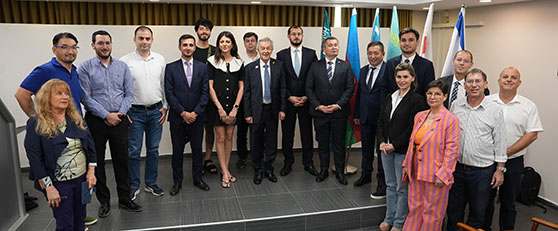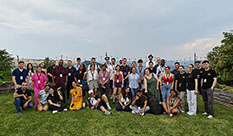More:
News & Stories
The third Euro-Asia seminar At HIT in collaboration with the Israeli MFA
On Thursday, May 23, 2024, the third Euro-Asia seminar was held at HIT-Holon Institute of Technology, in cooperation with the Israeli Ministry of Foreign Affairs. The hybrid seminar was a unique platform for meeting a delegation of young influencers from the fields of academia, media, economics, and government from Azerbaijan, Kazakhstan, Uzbekistan, and Georgia.

Since 2017, there has been extensive international activity between HIT and the Eurasian countries. This seminar is a token of appreciation for the extensive academic activity of HIT in the region. The Institute's involvement with Eurasian countries reflects HIT's vision to serve as a bridge between cultures and peoples, as well as an Israeli strategic interest in strengthening its relations with Muslim countries that supported Israel and provided refuge for Jews who escaped the horrors of the Holocaust.
The President of HIT Prof. Eduard Yakubov, said in his opening remarks: "This seminar is a true expression of our vision and desire to serve as a bridge between cultures and peoples, as well as build new bridges between nations and religions.
HIT’s President shared his thoughts on three reality-changing future projects that in his opinion are of global importance:
The Tree Seas Project - the Caspian Sea, the Aral Sea, and the Dead Sea, have a crucial role in the countries they are located in. Due to the global weather crisis, it is possible to turn things around for the better based on mutual Climate Studies
The second project is related to global tourism, namely the ancient Silk Road trail that can connect countries based on the development of Tech Tourism, and the third project is related to the unique study program in Digital Medical Technologies at HIT, which can be used as a tool for a digitation process of the entire medical systems in all Uzbekistan, Kazakhstan and Azerbaijan. We are proud to host the distinguished delegation and share our achievements in the academic field and technological innovation."
The seminar was attended by guests of honor which included the ambassadors of Uzbekistan, Azerbaijan, and Kazakhstan, and a representative of the Ministry of Regional Cooperation. Other invitees from the Israeli Ministry of Foreign Affairs were Ronen Krausz director of the Central Asia and Caucasus Department. Mr. Ran Natanzon, director of innovation, David Atar, consultant of the Central Asia and Caucasus department.
Students from HIT and students from Eurasian countries studying to complete a degree in computer sciences and applied mathematics also participated in the event.
The Ambassador of Azerbaijan, H.E. Mukhtar Mammadov, noted: "The partnership with HIT is an example of strengthening international ties and promoting collaborations in the fields of academia and innovation. We appreciate the opportunity to get to know this leading institution and its impressive activity”
The Ambassador of Uzbekistan, H.E. Jakhongir Aminov, added: HIT is a place that combines academic excellence with innovation, and we are happy to see the strengthening ties between our institutions."
The Ambassador of Kazakhstan, H.E Daulet Yemberdiyev, emphasized: "This seminar demonstrates the importance of international cooperation in the fields of science and technology. A few years ago I served at the Embassy in Israel and I’m very glad to be here again as the Ambassador of Kazakhstan in Israel. I’m looking forward to a future visit by the HIT delegation to our Higher Education institutions and I’m very pleased that we have a partner such as Holon Institute of Technology. We will continue to work together to promote understanding and friendship between our countries."
Among the participants of the delegation from Eurasian countries were leading influencers in the fields of travel, environment, etc.
The visit was particularly important considering the positive support of these countries for Israel. These countries, with a young population active on social media, constitute a significant target audience for maintaining a positive image of Israel in the academic, innovative, and social world.
- News & Events
International Week of Interdisciplinary Studies and Academic Collaborations in Crete
A substantial delegation of 16 students and four faculty members from HIT Holon Institute of Technology participated in week-long international activities and events at HMU-Hellenic Mediterranean University in Crete. ...


 Additional programs
Additional programs
